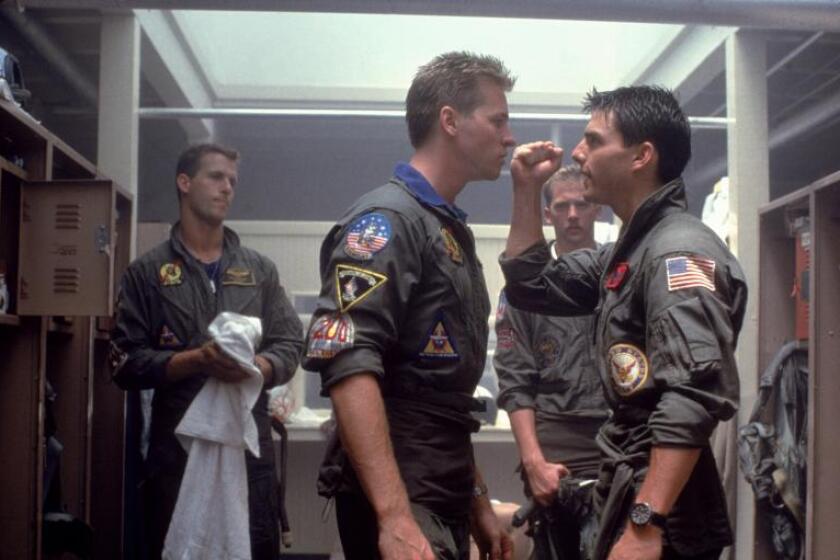MAMET TO WRITE NEW CAPONE FILM
- Share via
Eliot Ness, the headstrong tax cop who sent Al Capone to Alcatraz, is making a comeback, this time on the big screen.
Ness, and his incorruptible team of investigators, will be busting Big Al, Frank Nitti and other Prohibition-era vermin in a feature version of “The Untouchables” at a theater near you, perhaps as early as Christmas, 1986.
Paramount Pictures, which has owned some of the rights to Ness’ life story, cleared final legal hurdles last week and expects to go into production on the film in Chicago and Los Angeles later this year. Pulitzer Prize-winning playwright David Mamet, who grew up in Chicago, will write the script.
“When we approached him (Mamet), he said he didn’t want anybody but him to write the script,” says Art Linson, who will produce the film. “He said his high school was right across the street from the garage where the St. Valentine’s Day massacre took place.”
Linson, whose earlier efforts at Americana include “Fast Times at Ridgemont High” and “Melvin and Howard,” said no director, cast or budget will be set until Mamet’s script is finished. Mamet is ensconced in his Vermont home, sculpting the script, and not taking calls.
Linson says that by hiring Mamet, Paramount has committed itself to a serious, authentic re-enactment of Ness’ sensational ‘30s gang-busting activities, not a satire of the violent Desilu TV series that aired from 1959 to 1963.
“We didn’t want to do a parody, which has been suggested here in the past,” Linson says. “Mamet’s take on it is to look at these characters in a very real way. . . . He’s a wonderful playwright and screenwriter. You don’t bring in someone of his stature to do a rewrite of a TV series.”
“The Untouchables” will be Mamet’s third screenplay, following “The Postman Always Rings Twice” and “The Verdict,” which earned him an Oscar nomination. He won his Pulitzer for the play “Glengarry Glen Ross.”
PERFECT TIME: Leslie Borkin thinks she has been treated small, and now she’s thinking big.
“I’ve got Johnny Carson on my mind,” she says.
Borkin, who served as the real-life model for Laraine Newman’s pathetic man-chaser in James Bridges’ “Perfect,” wants to go on Carson’s “Tonight Show”--and any other talk show that will invite her--to tell how big-time journalism and a big-time movie maker can exploit a naive, anxious young actress.
While she’s telling her story, she won’t mind if a big-time producer sees her and decides to put her in a big movie.
“You bet. I’m trying to turn a terrible experience into a great one,” she says.
To backtrack: Borkin, here from Florida to chase a film career, was one of the key figures in writer Aaron Latham’s 1983 Rolling Stone story about singles life at West Hollywood’s Sports Connection health club. In the story, Latham described an incident where Borkin and a male friend drew a crowd by getting into a busy romantic clinch on the trunk of a black Mustang in a Sports Connection parking lot.
In the movie, the character based on her caps a frustrating night at a party by inviting several guys to join her in the back of a van.
Borkin admits that she and her friend drew a crowd around a Mustang a couple of years ago, and that Latham’s essential facts were accurate. But, she says, she’s hardly the “sleaze bag” she appeared to be in either the article, or the movie.
After the article came out she says she was deluged with obscene calls. One man, calling from Pennsylvania, was so anxious to leave his message, he panted it into her answering machine. “I had a male friend put his voice on the answer tape,” she says, “and they left obscene messages for him.”
Borkin says she considered suing, but she signed releases for both the magazine article and the movie. She was so flattered to be in Latham’s story, she says, and excited about the possibility of playing herself in the movie that she didn’t ask for a look at either the story or the script before signing.
As it turned out, Newman got the role based on Borkin, and Borkin was shunted into the background. But, she did have one line (“Most people join to work out”), and she was paid Screen Actors Guild scale--about $12,000 for less than three months’ work.
The most she’d ever earned for one job before was $2,000 for a Cinzano wine commercial that never aired.
“My luck out here hasn’t been real good, so far,” she says.
More to Read
Only good movies
Get the Indie Focus newsletter, Mark Olsen's weekly guide to the world of cinema.
You may occasionally receive promotional content from the Los Angeles Times.










